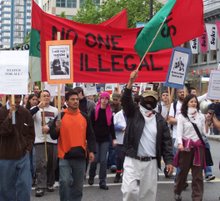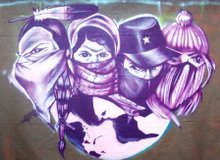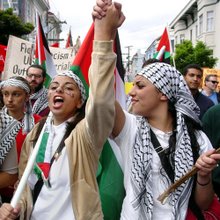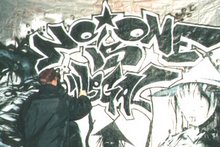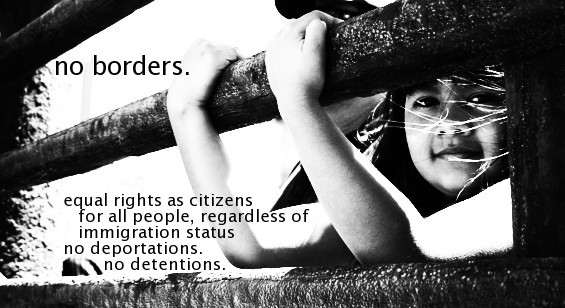Friday, February 9, 2007
Immigration and Privatized Detention in the US
Suspected illegal immigrants held in detention by the U.S. Department of Homeland Security are failing to receive timely medical treatment and adequate food, being subjected to frequent sexual harassment, and having their access to lawyers, relatives and immigration authorities improperly limited. These are among the findings of the department’s inspector general, based on an audit of the U.S.-owned and operated Krome Service Processing Center in Miami, a contract Corrections Corporation of America facility in San Diego, and local jails and prisons in Berks County, Pa., and Hudson and Passaic counties, N.J.
But critics of the agency called the report disappointing, contending that it watered down recommendations and ignored the most serious allegations of abuse collected since June 2004, which they said included physical beatings, medical neglect, food shortages and mixing of illegal immigrants in administrative custody with criminals.
(click here to read more)
Monday, February 5, 2007
Safe Third Country Agreement Challenged in Court
Three refugee advocacy groups are mounting a legal challenge to the Safe Third Country Agreement between Canada and the United States, arguing that the United States is not a safe country for all refugees and that the agreement is unconstitutional. Canada should not automatically send refugee claimants at the border back to the United States, and to do so is a breach of the Charter and of international refugee and human-rights law, Toronto lawyer Barbara Jackman said.
"It's not often someone goes to court moving to strike out an entire government program," said Ms. Jackman, who will argue the case Monday in Federal Court on behalf of the Canadian Council for Refugees, Amnesty International and the Canadian Council of Churches.
The Safe Third Country Agreement, implemented in 2004, requires refugee claimants to seek protection in the first country they reach, and has resulted in a dramatic drop in the number of asylum claims in Canada to just 23,000 last year, from an average of 30,000 annually a decade earlier.
(click here to read more)
Sunday, February 4, 2007
Migrant Boat Awaits Africa Rescue
Senegal and Mauritania are launching points for tens of thousands of African migrants looking to reach Europe, many via the Canary Islands.
(click here to read more)
Thursday, February 1, 2007
Native Students being called "savages"
SHOULD NATIVE STUDENTS BE CALLED "SAVAGES"? MNN. Jan. 29, 2007.
The following declaration was made by a 16-year old female Mohawk student of the Kahnawake Survival School. We would like to know if this is happening to our kids elsewhere. Please write in your story. Do you think she should have been suspended? Do you think the non-native teacher should have been defended by the staff?
I, Goldie, of Kahnawake swear that the following information is true: On Monday, January 22nd, 2007, at the Kahnwake Survival School, in the morning, I was in a class conducted by a teacher by the name of "Gino". He is a non-native first generation Italian-Canadian from Montreal who teaches language arts. We were sitting in class. "Just relax, chill out and we'll talk", Gino told the class of approximately 20 students. To me, he would rather talk than teach. I have already complained to Ed, the Vice Principal, about his lack of interest in providing proper instruction. We were all talking when he was speaking to one small group. Tiny, Curt, Code and myself started talking amongst ourselves. Shorty suddenly turned from Gino's group, freaked out and punched the wall. I asked, "Shorty, what's wrong?" Shorty said that Gino had called us "savages"! I asked Gino why? He explained that it was to "identify color"!! I couldn't believe that he would be so racist. Shorty said, "Don't lie. You did say we were savages". Shorty then walked out of the class room by breaking the door. Then Gino said, "You guys are acting childish. You took it the wrong way by saying I called you savages. It is to identify colors".
BPP Charges based on Torture Confessions
Murder Charges Against Former Black Panthers Based on Confessions Extracted by Torture
Police in California, New York and Florida arrested eight former Black Panthers earlier this week on charges related to the 1971 killing of a San Francisco police officer. Richard Brown, Richard O’Neal, Ray Boudreaux and Henry Watson Jones were arrested in California. Francisco Torres was arrested in Queens New York. Harold Taylor was arrested in Florida. Two men already in jail-- Herman Bell and Jalil Muntaqim -- were also charged. A ninth man -- Ronald Stanley Bridgeforth – is still being sought. The men were charged with the murder of Sgt. John Young and conspiracy to commit murder for a string of attacks on other officers. Harold Taylor and two other men were first charged with the murder of the police sergeant in 1975. But a judge tossed out the charges. Taylor and his two co-defendants said they made false confessions after police in New Orleans tortured them.
(Click here to read more)Queers and Immigration: A Vision Statement
Queers and Immigration: A Vision Statement
Two of the most divisive issues in the United States today are those concerning Lesbian, Gay, Bisexual, Transgender, and Queer rights and immigration. There is little discussion of how immigration is also an issue for queer people, and even less analysis of the structural similarities between queer and immigrant struggles. Queer immigrants are marginalized or invisible at the intersection of two identities. As a whole, more complex family structures -- such as those of binational same-sex couples and extended families -- are completely absent from the larger struggle for immigration reform.
The immigrant advocacy movement places undue emphasis on heteronormative relationships and conceptions of normality in an effort to gain basic citizenship rights. The mainstream LGBTQ rights movement tends to focus on those immigrants who are partners of US citizens. This leaves out the predicament of, for instance, single people and/or those who do not define themselves within conventional relationships like marriage or conjugality. Both movements are depriving themselves of the power and strategic insights that LGBTQ immigrants can provide. We, lesbian, gay, bisexual, transgender, queer, and gender-nonconforming people and allies, stand in solidarity with the immigrant rights movement. With this statement, we call for genuinely progressive immigration reform that helps LGBTQ immigrants.
(Click here to read more)Canadian immigrants battle chronic low-income
Immigrants battle chronic low income By MARINA JIMÉNEZ
Wednesday, January 31, 2007
A landmark national study confirms what new immigrants already know: They are financially no better off now than they were at the turn of the millennium, and have poverty rates three times higher than Canadians, despite their high levels of education. The Statistics Canada study is an indictment of Canada's immigrant selection model, which actively recruits skilled professionals, most of whom cannot get work in their fields, and are forced to accept jobs delivering pizza or pumping gas.
In 2002, low-income rates among immigrant families during their first full year in Canada were 3.5 times higher than those of people born in Canada -- higher than at any time in the 1990s. By 2004, they were 3.2 times higher. This is the first-ever study examining the chronic low income of immigrants, and the researchers tracked as many as 280,000 people over 15 years.
(Click here to read more)Homeland Security and the Business of Immigration
Author and radio host Deepa Fernandes joins us to talk about her new book, “Targeted: Homeland Security and the Business of Immigration.” Fernandes documents the hidden human struggles behind the immigration debate and exposes how big business has been a driving force in setting immigration policy.
DEEPA FERNANDES: Well, it's very interesting, actually, that the President is talking about a guest worker program. And, of course, we only ever hear a sound bite about a guest worker program, which the right is very quick to call an amnesty program and immigrant rights advocates are very quick to say it’s the furthest thing from it. Well, what I found in New Orleans is what I believe is kind of a petri dish, a testing ground for what this guest worker program will look like. And from all the immigration research and being in prisons, going to Haiti, seeing the frontlines of what immigrants are going through under US immigration policy, my last few trips to New Orleans have been truly shocking to see how the H-2B visa program, which is a low-skilled work program, how that is actually being implemented. And that is what Bush means when he says a guest worker program.
And let me just give you a really quick example of some of the folks who are living through this. So, Post-Katrina, the city's flooded, it needs to be rebuilt. Residents are dispersed en masse. The majority can’t return -- African American residents. They are stuck in trailer parks. They’re stuck all around the country. And there are many, many obstacles -- namely housing and employment -- to them coming back to the city. Very quickly, corporations begin to apply to the Department of Labor, which is the process that you do, to bring in foreign workers. Now, in countries like Peru and Bolivia and the Dominican Republic and some Asian countries, there's mass advertising happening: “Come and rebuild New Orleans. Come and help the devastated city. And we're looking for carpenters and mechanics and painters.” And so, so you have professionals in these countries who -- they’re poor countries. You can’t earn that much money. They apply for a visa. They have to go through a recruiting firm. That’s the way that you get this. They pay anything from $3,000 to $10,000, $15,000 just to be able to come to the United States to work.

